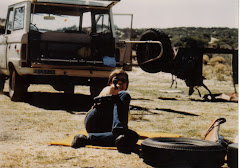
I grew up in Grand Forks. Actually, I went to 1st and 2nd grades in a little town 13 miles west of Grand Forks in which my grandfather owned a general store and a fleet of grain trucks. In his teens, Dad drove one of the trucks to bring farmers' wheat to the railroad. After high school, my dad worked for the Great Northern Railroad in those years, and took jobs in many towns in the northeast of North Dakota. I was born in Langdon, a little town about 8 miles from the Canada border.
Before I started school, Dad had managed to get a more stable position with the railroad back in Emerado. That led to a better job in Grand Forks as I was entering fifth grade.
During my childhood I experienced two of these spring floods. The first was in, I think, 1949. Beyond the river bank, the land is very nearly flat. Once the water rises beyond the levees, it's free to sheet across miles of flat farmland. In '49, I recall that the water in Emerado was 2-3-feet deep.
You couldn't drive a car. Most didn't try to drive trucks. Basements filled with water, but the first floor of houses were often left dry, very slightly above the level of the water. The hardwood floor of my grandfather's store was soaked, causing it to buckle and bulge. Everyone waded around in the streets for a few days, but after a few days or weeks of fixin' and cleanin', things gradually returned to normal.
The second flood, after we moved to Grand Forks, was similar, maynbe not so bad--except now we were closer to it. Aside from a basement full of water, we escaped fairly unscathed. The only thing I remember clearly was the National Guard working on the levees and their amphib vehicles the only vehicles in the streets.
I was a mite young in those days, but most able-bodied individuals would involve themselves in sandbagging the levees, patrolling them, sandbagging around their dwellings and businesses and other work to save their property from the high water.
The river swells every spring there, mostly due to the snow melt. Factors affecting the degree of flooding include the amount of snow on the ground and the suddenness of the spring thaw and, of course, the severity of spring rains.
The 1997 flood was apparently particularly severe, since much of the effort was in vain and there were many dwellings and business buildings lost. I wasn't there, but I'm sure that the heroic efforts of the area residents at least equaled and probably surpassed those of other years.
We're not getting so much news from Grand Forks this spring, since the more urgent danger seems to be 80-miles south, in Fargo. We see a lot of video of local residents working very hard filling and placing sandbags atop the levees there.
Pridefully, I have to say that Dakotans live tougher lives than do most of us, and are aware of the special problems that exist in that part of the country. There's a willingness to work together to overcome these problems. Part of it is a hardy individualism coupled with the knowledge that a benevolent cooperation will overcome difficulties that are just too much to handle alone.
The National Guard is there, as usual--probably in smaller numbers since the feds have commandeered many of them to do the regular Army's job in Afghanistan and Iraq--and using its heavy equipment to its best advantage.
I'm kind of proud, in a way, to have grown up in those surroundings, because I know I'd be there helping if I were still living in that part of the country. Most of us were brought up aware of our situation, to be self reliant with a sense of benevolence for our neighbors.
I've heard just about enough of California whining.
Warm regards,
Col. Hogan
Stalag California






6 comments:
Bill and I were talking about that the other day. We saw a report on TV where the kids, teenagers, and everyone was pitching in in North Dakota. No whining for the federal government to do a fly over and send troops. Just everyone taking care of themselves and their family. The world could take a lesson.
No whining for the federal government to do a fly over and send troops. Just everyone taking care of themselves and their family. The world could take a lesson.
A certain city way down south could take a lesson - that's for sure. ;-)
sasob
smartass sob is right, we still have many of them crying about Katrina which was over two years ago now, crying about how the govmint isn't doing enough to make their lives worth living...
Thank goodness the folks in Dakota have a spine and tough minds to get them through a situation that they know will come from time to time.
They used to call it "relief" when I was growing up. It was pretty hard to get and people were loathe to accept it. I knew elderly folks who would sew, clean homes or do handyman work rather than go down to the county. Mostly, family helped.
It's probably not like that any more there, since federal intervention in the children's prisons is probably working to make dependents of them too, but the desire to do for yourself and not beg for help runs high.
SA,
The Katrina disaster was more a government critter than an act of nature. City and state officials took the money that was supposed to reinforce the levees and put it ????
GWB's FEMA was utterly inept--and still is. The Louisiana National Guard was more interested in disarming the locals and flying the district Congressman to his home to retrieve the graft money in his freezer than in providing help for the stranded folks.
It's my opinion that if a disaster of that magnitude happened in the upper midwest, it would've been much less devastating. Note that throughout the entire debacle, relatively little was heard from the people of the Alabama and Mississippi gulf areas--even though they suffered through the very same storm.
TF,
Yes, and my comments above would include the Texas gulf coast, as well. While their occasionally severe hurricanes cause a lot of damage, people there do what they have to do. We don't hear a lot of wailing and gnashing of teeth from down that way.
Post a Comment